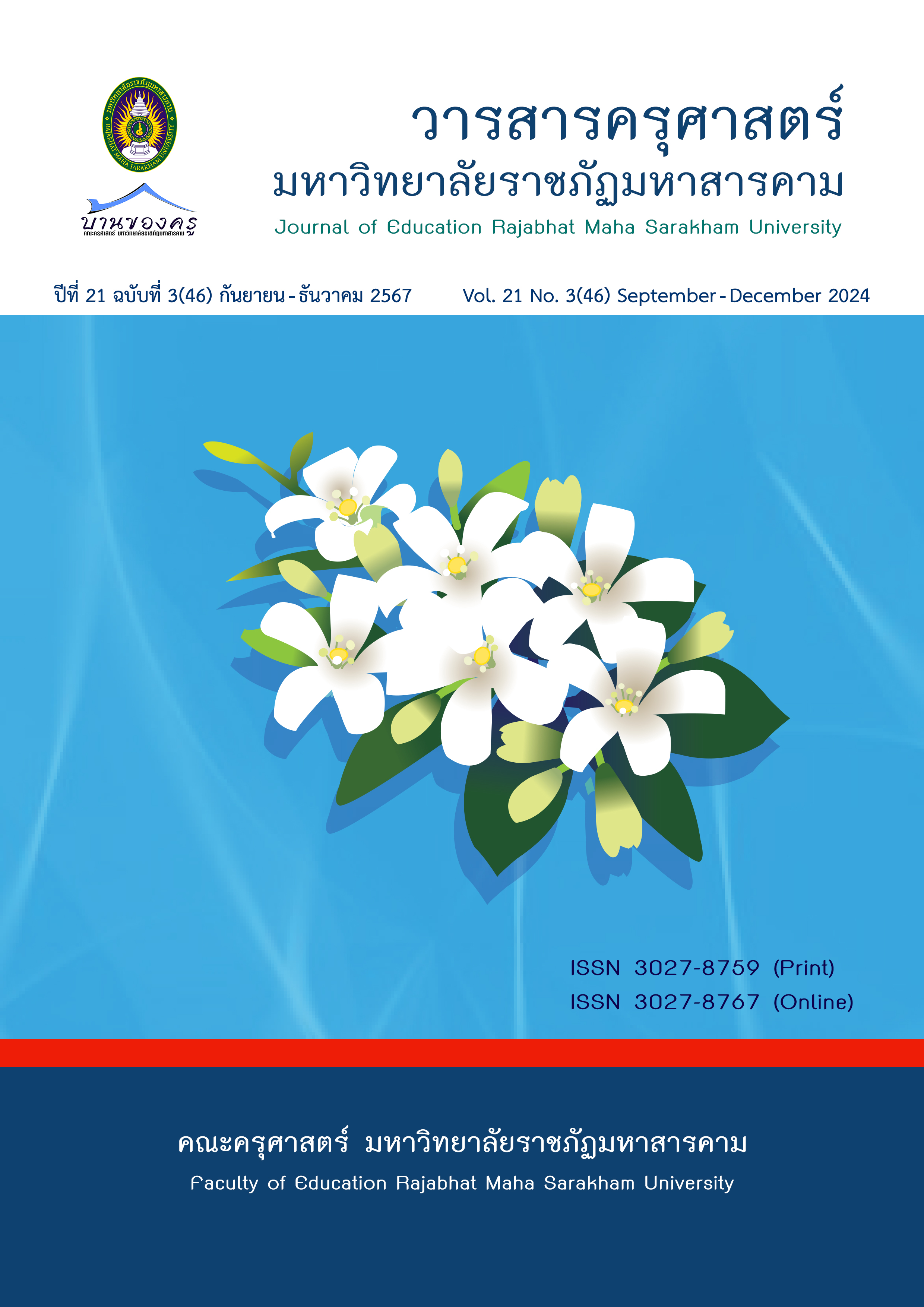The Effects of Using Explicit-reflective Approach Instruction on Nature of Science Understanding and Science Process Skills of Grade 4 Students at Muangwapipathum School in Mahasarakham Province
Main Article Content
Abstract
The purposes of this research were to 1) compare nature of science understanding of grade 4 students learning through the explicit-reflective approach instruction with those of students learning through the traditional learning, and 2) compare science process skills of grade 4 students learning through the explicit-reflective approach instruction with those of students learning through the traditional learning. The sample was 70 grade 4 students from two classrooms, in the first semester of the academic year 2023, at Muangwapipathum school in Mahasarakham province, obtained from cluster random sampling. The research tools were 1) 8 lesson plans using traditional learning instruction, 2) 8 lesson plans using explicit-reflective approach instruction, 3) a measurement form of science understanding, and 4) a measurement form of science process skills. Statistics employed for data analysis were the mean, standard deviation, and independent sample t-test.
The results of this research were as follows: 1) the nature of science understanding of grade 4 students in the explicit-reflective approach instruction was higher than the students in the traditional learning at the .05 level of statistical significance, and 2) the science process skills of grade 4 students in the explicit-reflective approach instruction was higher than the students in the traditional learning at the .05 level of statistical significance.
Article Details

This work is licensed under a Creative Commons Attribution-NonCommercial-NoDerivatives 4.0 International License.
ข้อกำหนดเบื้องต้นที่ผู้นิพนธ์(ผู้ส่งบทความ) ควรทราบ
1. ผู้นิพนธ์ที่ประสงค์จะลงตีพิมพ์บทความกับวารสาร ตั้งแต่เดือนมกราคม 2563 เป็นต้นไป ให้ใช้รูปแบบใหม่ (Template 2563) โดยสามารถดูตัวอย่างได้ที่เมนู GUIDELINES
2. จะตีพิมพ์และเผยแพร่ได้ ต้องผ่านการประเมินจากผู้ทรงคุณวุฒิ (Peer Review)
3. การประเมินบทความโดยผู้ทรงคุณวุฒิ (Peer Review) เป็นแบบ Double Blind
4. การอ้างอิงบทความใช้หลักเกณฑ์ APA (American Psychological Association) คลิก
5. บทความถูกปฏิเสธการตีพิมพ์ ไม่ผ่านการประเมิน ผู้นิพนธ์ขอยกเลิกเองหรือชำระเงินก่อนได้รับการอนุมัติ ทางวารสารไม่มีนโยบายการคืนเงิน
References
กระทรวงศึกษาธิการ. (2553). หลักสูตรแกนกลางการศึกษาขั้นพื้นฐาน พุทธศักราช 2551. ชุมนุมสหกรณ์การเกษตรแห่งประเทศไทย.
กาญจนา มหาลี. (2553). การพัฒนาความเข้าใจธรรมชาติของวิทยาศาสตร์ของนักเรียนชั้นมัธยมศึกษาปีที่ 1 โดยการสอนแบบชัดเจนร่วมกับการสะท้อนความคิด [วิทยานิพนธ์ปริญญามหาบัณฑิต], มหาวิทยาลัยเกษตรศาสตร์.
คงศักดิ์ วัฒนะโชติ. (2558). กิจกรรมค่ายทักษะกระบวนการทางวิทยาศาสตร์ระดับประถมศึกษา. โอ. เอส. พริ้นติ้ง เฮ้าส์.
จุฬารัตน์ ธรรมประทีป. (2557). ประวัติ ปรัชญา วัฒนธรรม และธรรมชาติของวิทยาศาสตร์. ใน ประมวลสาระชุดวิชาสารัตถะ วิทยวิธีและธรรมชาติของวิทยาศาสตร์. (หน่วยที่ 1, น. 1-62). มหาวิทยาลัยสุโขทัยธรรมาธิราช.
บุญชม ศรีสะอาด. (2553). หลักการวิจัยเบื้องต้น. สุวีริยาสาสน์การพิมพ์.
บุญเชิด ภิญโญอนันตพงษ์. (2545). การประเมินการเรียนรู้ที่เน้นผู้เรียนเป็นสำคัญแนวคิดและวิธีการ. วัฒนาพานิช.
เบญจา เรืองเสมอ. (2549). ผลการจัดการเรียนรู้วิทยาศาสตร์แบบสืบเสาะหาความรู้โดยเน้นเทคนิคการตั้งคําถามที่มีต่อทักษะกระบวนการทางวิทยาศาสตร์ ของนักเรียนชั้นประถมศึกษาปีที่ 3 [วิทยานิพนธ์ปริญญามหาบัณฑิต], มหาวิทยาลัยศรีนครินทรวิโรฒ ประสานมิตร.
ปริณดา ลิมปานนท์. (2547). การศึกษาการจัดการเรียนการสอนธรรมชาติของวิทยาศาสตร์ ของครูตามกลุ่มสาระการเรียนรู้วิทยาศาสตร์ [วิทยานิพนธ์ปริญญามหาบัณฑิต], จุฬาลงกรณ์มหาวิทยาลัย.
พรรณนิภา ทับทิมทอง. (2560). การพัฒนาทักษะกระบวนการทางวิทยาศาสตร์ของนักเรียนชั้นประถมศึกษาปีที่ 4 โดยใช้การทดลองวิทยาศาสตร์ [วิทยานิพนธ์ปริญญามหาบัณฑิต], มหาวิทยาลัยธุรกิจบัณฑิตย์.
พิมพันธ์ เดชะคุปต์. (2545). การจัดการเรียนการสอนที่เน้นผู้เรียนเป็นสำคัญ. เดอะมาสเตอร์กรุ๊ป.
ล้วน สายยศ และ อังคณา สายยศ. (2538). เทคนิคการวิจัยทางการศึกษา. สุวีริยาสาส์น.
ลือชา ลดาชาติ และ ลฎาภา สุทธกูล. (2555). การสํารวจและพัฒนาความเข้าใจธรรมชาติของวิทยาศาสตร์ของนักเรียนชั้นมัธยมศึกษาปีที่ 4. วารสารมหาวิทยาลัยนราธิวาสราชนครินทร์, 4(2), 73-90.
ลำเจียก กำธร, จิณัฐตา ศุภศรี, และ ฐาปนี อัครสุวรรณกุล. (2560). การพัฒนาการจัดการเรียนการสอนเพื่อส่งเสริมทักษะการสะท้อนคิดของนักศึกษาพยาบาลในรายวิชาปฏิบัติการพยาบาลบุคคลที่มีปัญหาทางจิต. วารสารเครือข่ายวิทยาลัยพยาบาลและการสาธารณสุขภาคใต้, 4(1), 15-27.
สถาบันส่งเสริมการสอนวิทยาศาสตร์และเทคโนโลยี. (2551). ตัวชี้วัดและสาระการเรียนรู้แกนกลางกลุ่มสาระการเรียนรู้วิทยาศาสตร์ตามหลักสูตรแกนกลางการศึกษาขั้นพื้นฐานพุทธศักราช 2551. ชุมนุมสหกรณ์การเกษตรแห่งประเทศไทย.
สมเกียรติ พรพิสุทธิมาศ. (2551). การสอนวิทยาศาสตร์โดยเน้นทักษะกระบวนการ. วารสารก้าวทันโลกวิทยาศาสตร์, 8(2), 28-38.
เสาวนีย์ เกิดด้วง. (2558). การจัดการเรียนรู้แบบสืบเสาะหาความรู้เพื่อพัฒนาทักษะกระบวนการทางวิทยาศาสตร์ของนักเรียนชั้นประถมศึกษาปีที่ 4 [วิทยานิพนธ์ปริญญามหาบัณฑิต], มหาวิทยาลัยเกษตรศาสตร์.
เอกชัย วิเศษศรี. (2557). โมเดลเชิงสาเหตุของทักษะการสะท้อนคิดและผลสัมฤทธิ์ทางการเรียนวิชาวิทยาศาสตร์ของนักเรียนประถมศึกษาปีที่ 6 ที่มีการสอนแบบสะท้อนคิดของครูเป็นตัวแปรปรับ: การวิจัยเชิงทดลอง [วิทยานิพนธ์ปริญญามหาบัณฑิต], จุฬาลงกรณ์มหาวิทยาลัย.
Abd-El Khalick, F.,Bell, R. L., & Lederman, N. G. (1998). The nature of science and instructional practice: Making the unnatural natural. Science Education, 82(4), 417-436.
Abd-El-Khalick, F., & Lederman, N. G. (2000). The influence of history of science course on student’ views of the nature of science. Journal of Research in Science Teaching, 37(10), 1057-1095.
Abd-El-Khalick, F., Bell, R. L., & Schwartz, R. S. (2002). View of nature of science questionnaire: Toward valid and meaningful assessment of learners’ conceptions of nature of science. Journal of Research in Science Teaching, 39(6), 497-521.
Fishwild, J. E. (2005). Modeling instruction and the nature of science. [Master,s thesis, Wisconsin-Whitewater University].
Hodgin, E., & Kahne, J. (2018). Misinformation in the information age: what teachers can do to support Students. Social Education, 82(4), 208-212.
Khishfe, R., & Lederman, N.G. (2006). Teaching nature of science within a controversial topic: Integrated versus nonintegrated. Journal of Research in Science Teaching, 43(4), 395-418.
Khishfe, R. (2008). The development of seventh graders’ views of nature of science. Journal of Research in Science Teaching, 45(4), 470-496.
Lederman, N.G., & O’Malley, M. (1990). Student’s perceptions of tentativeness in science: Development use and sources of change. Science Education, 74(2), 225-239.
Lederman, N. G. (2002). Views of nature of science queationaire: Toward valid and meaningful assessment of learner’s conception of nature of science. Journal of Research in Science Teaching, 39(6), 497-518.
Losh, S.C., Tavani, C.M., Njoroge, R., Wilke, R., & McAuley, M. (2003). What does education really do? Educational dimensions and pseudoscience support in the American general public. The skeptical Inquirer, 27(5), 30-36.
Matthews, M. R. (1994). Science teaching: The role of history and philosophy of science. Routledge.
McComas, W. F. (1998). The principal elements of the nature of science: Dispelling the myths. The Nature of Science in Science Education. Kluwer Academic Publishers.
Rudge, D.W., & Howe, E.M. (2009). An explicit and reflecttive approach to the use of history to promote understanding of the nature of science of science. Science & Education, 18(5), 561-580.
Schwartz, R. S., Lederman, N. G., Khishfe, R., Lederman, J. S., Matthews, L., & Liu, S. Y. (2002). Explicit/Reflective instructional attention to nature of science and scientific inquiry: impact on student learning. The Annual International Conference of the Association for the Education of teachers in Science, 22(1), 1-22.
Schwartz, R. S.,Lederman, N. G., & Crawford, B. A. (2004). Developing views of nature of science in an authentic context: An explicit approach to bridging the gap between nature of science and scientific inquiry. Science Education, 88(4), 610-645.


